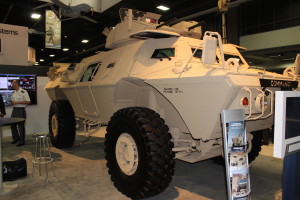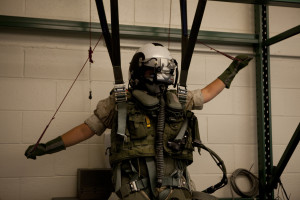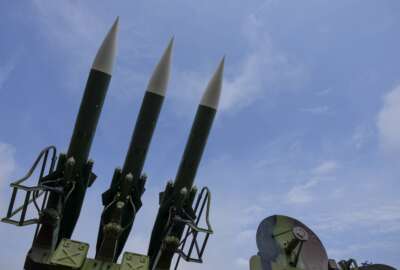10 takeaways from the AUSA conference
With the convention wrapped up, here's a list of major factors the Army is tackling, and what they're doing to improve them.
The 2015 Association of the United States Army conference and exposition brings together Army officials and experts showcasing their efforts to combat challenges the service is facing.
With the convention wrapped up, here’s a list of major factors the Army is tackling, and what they’re doing to improve them. Click the photos below to link to exclusive interviews and related stories on the AUSA convention.
1) Army University will fix its curriculum for better transitions to civilian life
The Army is redesigning how it helps soldiers transfer the knowledge and skills learned on the battlefield into a civilian-world education. The developing Army University construct allows soldiers to enter the trade market with civilian sector certifications or finish a degree in a subject they want at sponsored universities.
“What we’re truly trying to build, it’s a progressive and sequential education system that builds on
the foundation principles of the knowledge, skills and attributes that we give our soldiers and make sure that in every opportunity it equates to transition jobs in the civilian sector,” said Sgt. Maj. of the Army, Dan Dailey.
2) The “fly on the wall” is a very real security concern
Eavesdropping is a concerns for every business when it comes to striking deals, but it’s a major concern when it comes to military acquisitions.
Squadron Defense Group CEO Keith Marino said it’s an often overlooked security concern. “We’ve been asked, ‘how do we prevent the guy sitting on the street from listening to our mergers and acquisitions?'” Marino said.
“They can use…all kinds of bugs. It’s interesting spy kind of stuff, but its a very real and often overlooked hole in the security plan.”
3) Good market positioning is key for cybersecurity contractors
Cybersecurity contractors seem to pop up as often as zero-day attacks. But, the established ones are finding they can attract fresh investment if they target niche or upcoming cyber markets with special skill sets that are harder to find.
“What they came to us specifically for was, ‘can you prevent the threat? Can you tell us where the threat is happening ahead of time?'” said Marino. “That is a much smaller group of folks and a harder to get, but that’s where we’re headed and that’s what we have to roll out”
4) Video games are a great way to train new recruits
The Army is using virtual trainers and simulators to prepare its soldiers for the battlefield. Training technology can range from how to drive a type of vehicle to firing a weapon to combat medical procedures.
Raytheon’s Vice President of Training Solutions said it saves the taxpayers money, and above all, keeps training safe for those involved.
“One of the things we’ve discovered is that this generation, they are genuinely digital natives,” Williams said. “They grew up on Xboxes and game technology, so they take to this kind of training much quicker. Their ability to take the training on board is very quick, much quicker than others would be, and so we find it much more efficient to train them in this way.”
5) New tech facilities out West will help the military compete with the private sector
The military increasingly has been worried that it will not be able to compete with the private sector in recruiting a technology-savvy workforce. Maj. Gen. John Wharton, commanding general of Army Research Development and Engineering Command, said the Army is building a second research lab in Southern California as a means of attracting young, technology-minded personnel.
“Many of the kids that are out there don’t want to move east, they want to stay out west,” Wharton said. ARL West “will be different than just an ARL. It will look for all our other organizations to participate, to do recruiting and to have an open campus-like atmosphere or ecosystem out there,” Wharton said.
6) The military needs to speed up weapons and product testing
It seems like there’s such a thing as “too much testing” when it comes to products for the military. Army acquisition chief Heidi Shyu said the government should consider ways to watch industry development tests so that it does less of its own duplicative testing.
“Industry spends all [this] time and effort doing the development testing. They hand it over to the government, who repeats the same thing and extends the time and costs additional money, and then you go to operational tests,” said Shyu. “There’s layers and layers of testing that’s taking stuff forever to deliver to the hands of our soldiers.”
7) The retirement wave hitting the government is affecting the military too

“As these individuals are starting to look towards retirement, were gonna see a lot of experience leave the force,” said Lt. Gen. Michael Williamson. “The challenge is though as the economy continues to get better, it presents more choices for our workforce and so what we have to do everyday is make sure that we continue to attract great people, keep them interested and occupied and grow them to become senior leaders.”
8) The continuing resolution for the budget could push talent to other industries
The current budget fight is having an affect on troop retention because service men and women worry whether they may be out of a job soon.
“If you had to worry about whether you were going to be paid or have a job the next day because your organization couldn’t figure out the budget, in many cases you would look for another job,” said Williamson.
“Our most talented individuals are affected by this and I think one of the things we should offer our employees is stability. They should understand that we’re going to pay out bill. I consider the continuing resolution to have a really really terrible effect on the morale and on the capacity of our workforce.”
9) Small steps are helping combat vehicles become more energy efficient
 Military vehicles have a reputation for being gas guzzlers. New technologies and innovations are gearing horsepower towards greener options.
Military vehicles have a reputation for being gas guzzlers. New technologies and innovations are gearing horsepower towards greener options.
“In the case of the tank, one of the things we’ve brought on board is an auxiliary power unit,” said Brig. Gen. David Basset.
“What that allows it to do is drive all the electric systems on the vehicle while its parked without having to run the turbine engine which gives us all the horsepower and mobility we need, but isn’t exactly fuel efficient.”
10) The Army will open more specialties for women
Capt. Kristen Griest and 1st Lt. Shaye Haver made history this year after becoming the first women to graduate from Army ranger school. Theirs achievement has opened up the conversation for women in other positions across the military. According to Maj. Gen. Jeffery Snow, that women will become more integrated soon.
“We absolutely need women to join our ranks, and we are opening up increasing specialties for some of these women.”
View all Federal News Radio’s coverage of the 2015 AUSA Annual Meeting & Exposition.
Copyright © 2025 Federal News Network. All rights reserved. This website is not intended for users located within the European Economic Area.










